The Ultimate Guide to Hiring Your First Employees at a Startup

Finding and hiring the first 5-10 employees at your startup is one of the most difficult tasks most founders face.
That’s why Twitter is filled with tweets like these:

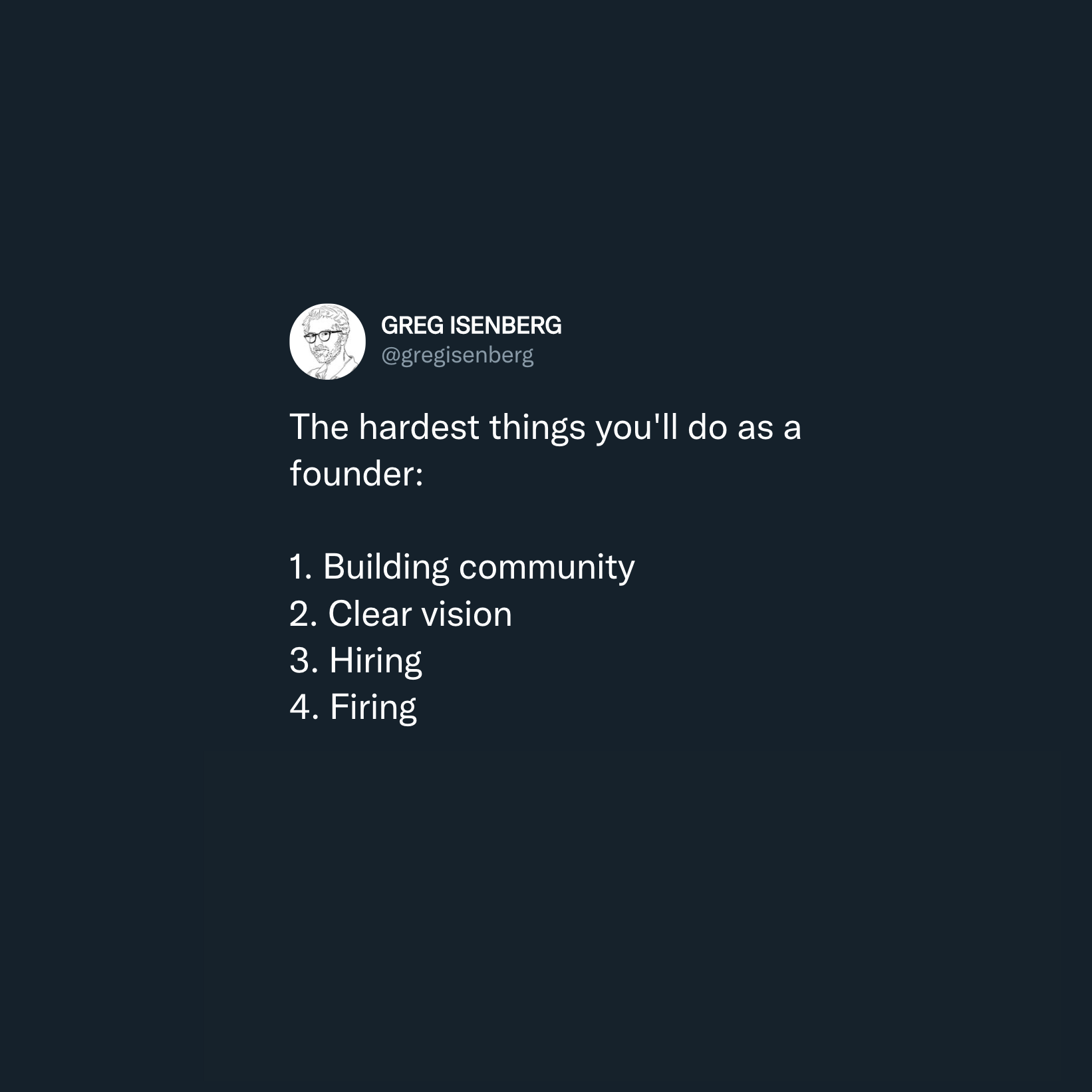
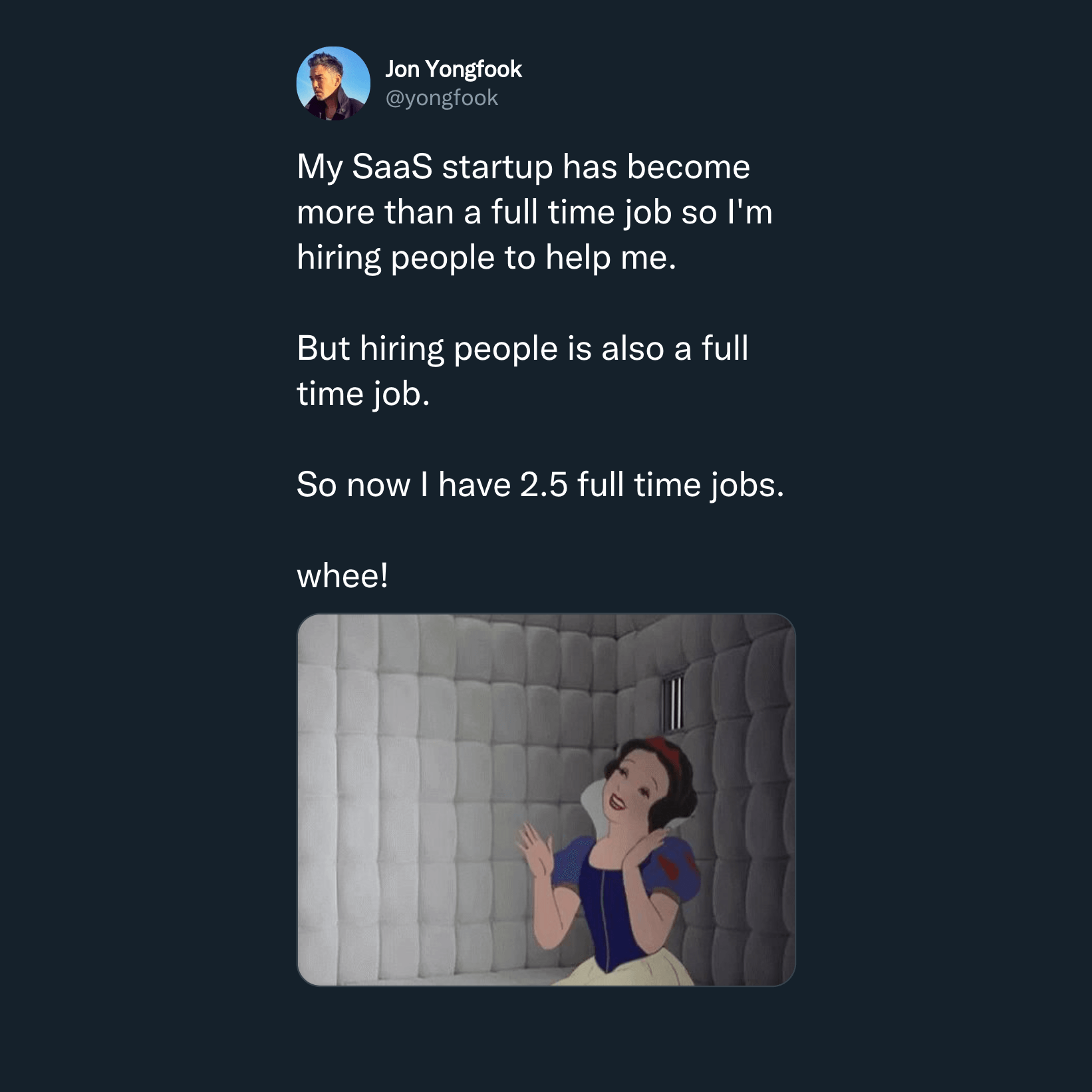
There are a few different reasons why the process is so daunting and challenging, but one of the first obstacles you’ll face is simply deciding which roles to fill first.
Should you hire a marketer? And if so, do you need a content marketer, marketing specialist, or something else entirely? What type of engineer should you hire? When does it make sense to hire an outbound salesperson?
You could spend hours brainstorming on all these questions, or you could save yourself some time and read this guide.
We’ll dive into the specifics of when you should hire your startup’s first employees, who to hire, and give you a ton of tips from founders who’ve been through the journey.
Let’s jump in.
Why Your First Hires Are So Important
You’ve probably heard the stories about how several of Facebook’s first employees went on to be wildly successful.
For instance, one of Facebook’s first product managers went on to co-found GoodRx. Another employee became an early investor in wildly successful companies like Spotify and Asana. The list goes on.
Those first hires set the foundation that catapulted Facebook to become a trillion-dollar company. Now imagine if Facebook started with a different set of employees. Who knows what their trajectory would’ve looked like.
While that’s an extreme example, it speaks to the importance of who your first hires are. The positions you hire for, and the people that fill those positions, play a major role in what the future of your business will look like.
Your first hires build the foundation that your startup will stand on.
Hire the wrong people and you’ll deal with a crumbling foundation filled with high turnover, a toxic culture, or even a failed startup.
When you hire the right people, you’ll have a solid foundation that you can continue to build on for years and years to come.
Choose wisely!
When is it Time to Start Hiring At Your Startup?
You’re probably reading this because you’re at the point where you’re considering hiring your first employee(s). But how do you know whether or not this is the right time to start?
Most of the founders we spoke with shared one thing in common: they knew it was time to hire when they felt a pain point.
For instance, Josh Ho, founder of Referral Rock, said a good sign is when you have the combination of a pain point + a repeatable process. You can hear more about his approach here.
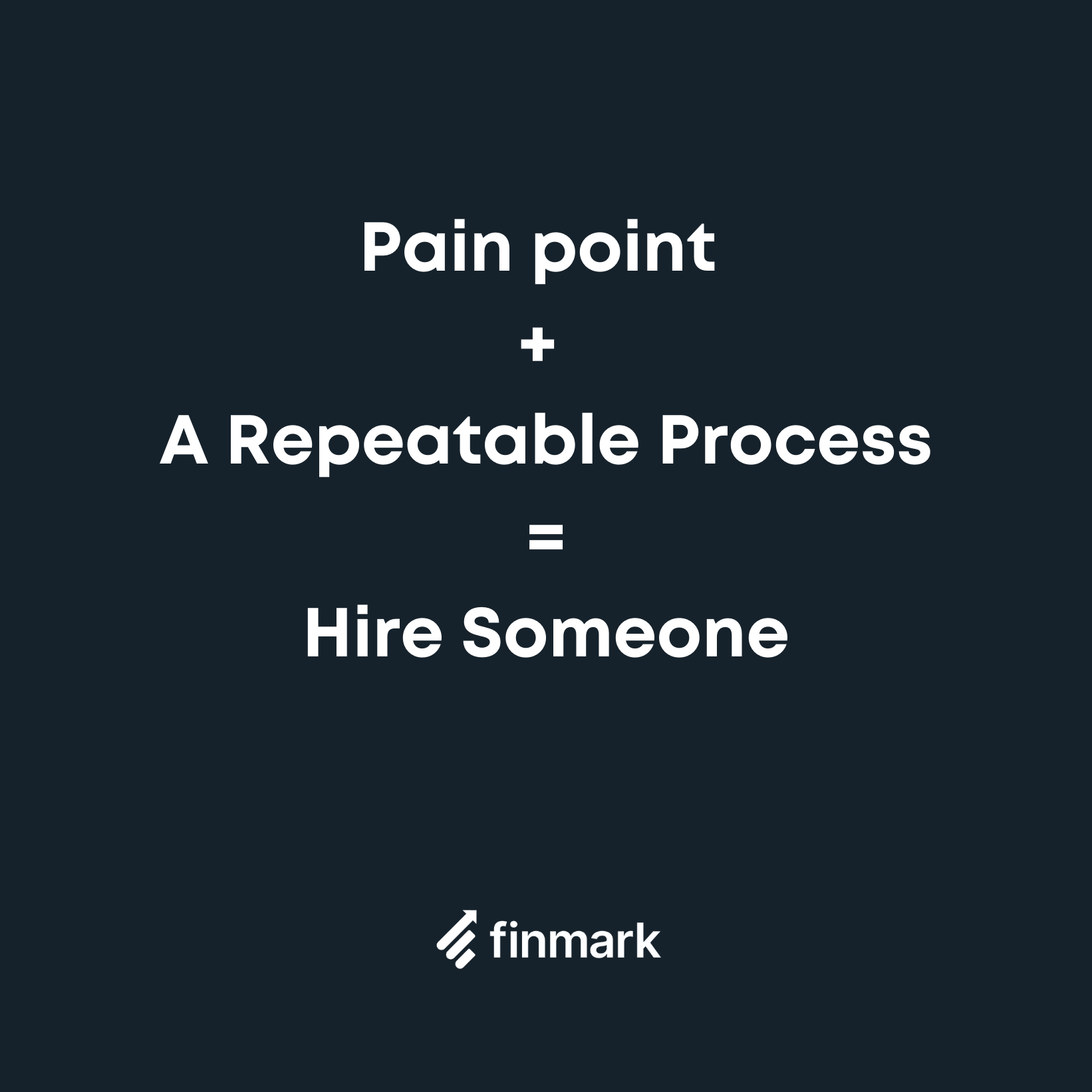
When you notice certain tasks are taking up too much of your time and aren’t the best use of your skills, it might be time to look for someone else to do it—as long as you can afford it.
I realize that in some cases that’s easier said than done. When I spoke to Josh Pigford, founder of Maybe, he said that as a founder, there can be a tendency to want to do most things yourself for as long as possible in order to avoid hiring prematurely. But once certain tasks become a distraction from building your business, you should consider hiring someone.
In some cases, it might not be an “urgent” pain point or distraction, but more of a gap or necessity to build your product.
For instance, the first non-founder hire at Finmark was our head of design. In our case, the need to hire didn’t come because the founders were spending too much time on design. The need arose because usability and design were crucial for the launch of the product and it’d be an ongoing need. Since the founders weren’t designers, they hired someone with the skillset to do it properly.
It’s kind of like when you notice a pain in your body. You can self-diagnose it or just endure the pain for as long as possible. But if the pain doesn’t go away, eventually you’re going to need a doctor to step in to diagnose the problem and give you a solution so the pain goes away.
A Framework For Deciding Which Roles to Hire
Once you’ve decided that you want to start hiring, the next question is “who should I hire first?”
The truth is there isn’t a right or wrong answer. It depends on your skills as a founder, the type of business you’re in, and a multitude of other factors.
After talking to nearly a dozen founders about their first hires, we’ve put together a framework to help you decide who your first hires should be.
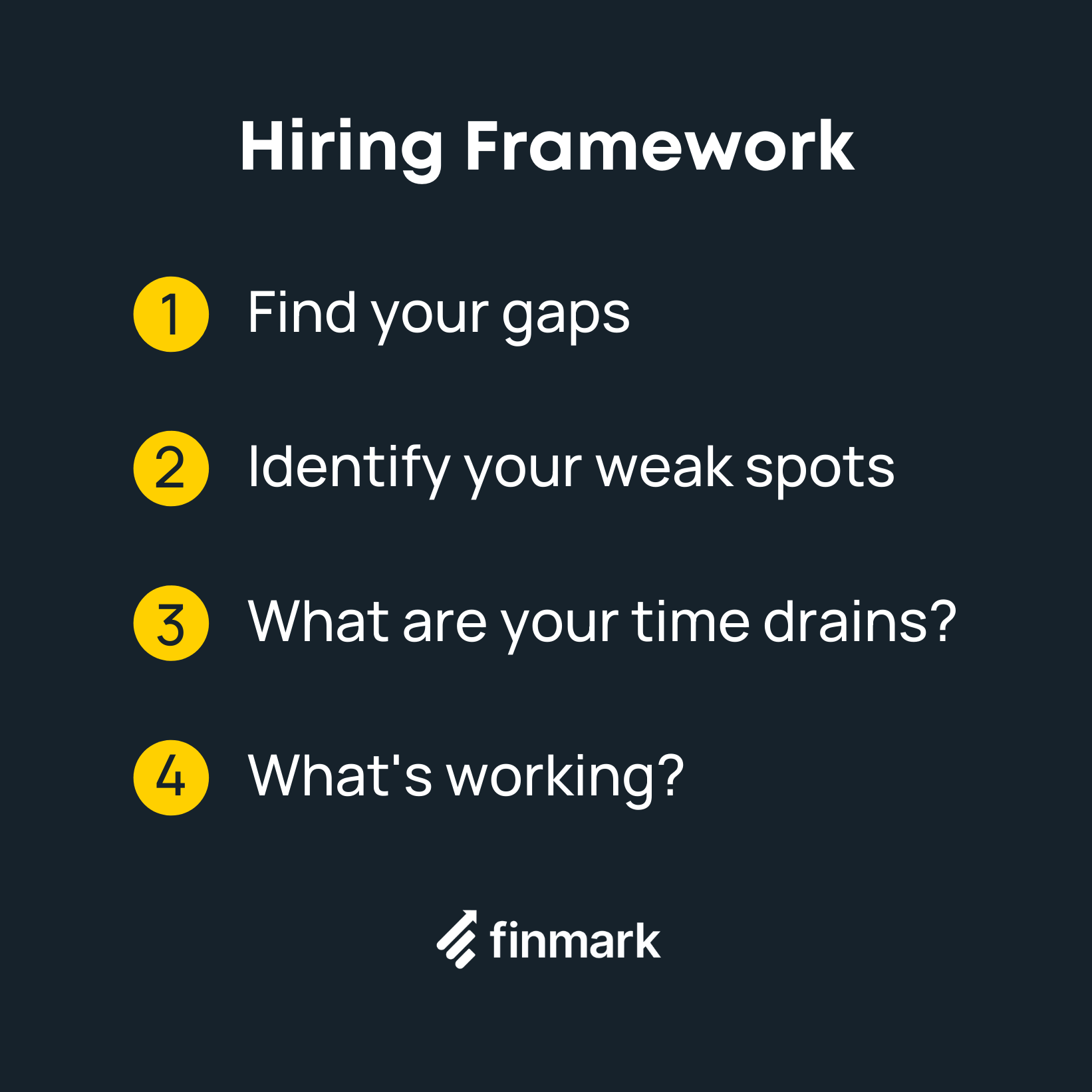
Where Are Your Gaps?
Do you have a skills gap in your startup that’s restricting you somehow?
The classic example of this is if you’re a non-technical founder with an idea and maybe an MVP built in a no-code tool. In order to make the product fully functional, you need an engineer to build it.
In that scenario, you have an engineering gap and you likely need to hire someone. Other skills gaps could be design or industry-specific knowledge.
You should start by filling gaps that are necessary for the core parts of your business at the stage you’re in.
What Are Your Weak Spots?
A weak spot is different from a gap. Weak spots are the skills that you can do, but you’re not very good at.
For instance, you might be able to give a product demo, but you tend to stumble over your words, aren’t great at answering questions, and struggle to describe how your product can solve your lead’s pain points. As a result, you’re losing potential customers that would’ve otherwise converted.
In that scenario, your weak spot is sales and customer success. Having someone who is uniquely great in that area will help you out significantly, so it makes sense to make that one of your first hires.
What’s Taking Up Most of Your Time?
This is a big one. Most of the founders we spoke to mentioned this as one of the biggest signs you should start hiring.
If a certain task is taking up a significant amount of your time and isn’t something you’re uniquely good at, consider hiring someone else to do it.
For example, if you’re spending a significant amount of time responding to customer support tickets as the founder, and it’s stopping you from focusing on growth, customer success will likely be one of the first positions you hire.
What’s Working Well?
Sarah Hum, the co-founder of Canny, wrote a great article detailing her experience with her first hire.
She was trying to decide which role to hire first and she and her co-founder initially thought of hiring an outbound salesperson because their goal was to grow revenue faster. They had never done outbound sales before but they figured it’d be a good way to get more customers.
Still unsure of whether or not it was the right move, they decided to talk to other founders about their situation. In each conversation, they kept getting asked one question: “Which acquisition channels are working for you today?”
That’s when the lightbulb came on.
They weren’t currently getting any customers from outbound sales because they weren’t doing it. The acquisition channel that was working for them was content marketing. So rather than take a chance with a new channel that was unknown, they realized it made more sense to double down on what was already working.
If your primary reason for hiring is because you want to accelerate growth but you have limited bandwidth, consider hiring for a role that will help you expand the parts of your startup that already generate a good return.
Who Should Your First Hires Be?
Now that you have the framework, here’s some advice on when it makes sense to hire for specific roles. This is based on data we got from founders about who their first 10-15 hires were.
Engineers & Designers
Since most of the founders we heard from work in SaaS, it’s not surprising to see most of their first hires were engineers.
Engineers come in handy even if you’re a technical founder. For instance, James Avery was an experienced engineer when he founded Kevel. However, his first hire was a junior engineer fresh out of college.

Designer
Another trend we found was designers. If your product is software, design is a critical part of usability. Therefore, hiring a designer early on can pay dividends.
Again, that’s why our first hire at Finmark was a designer. Financial planning software tends to be pretty ugly, so our tool’s design and UX is a big differentiator for us. And we’re not alone.
Travis Hedge, co-founder of Vouch also went with a lead designer as one of his first three hires. Bart Lorang, founder of FullContact chose a designer and an engineer as his first two hires.
Another option is to follow the advice of Aaron Epstein, Partner at Y Combinator and co-founder of Creative Market. Aaron recommends hiring engineers that also have design experience.
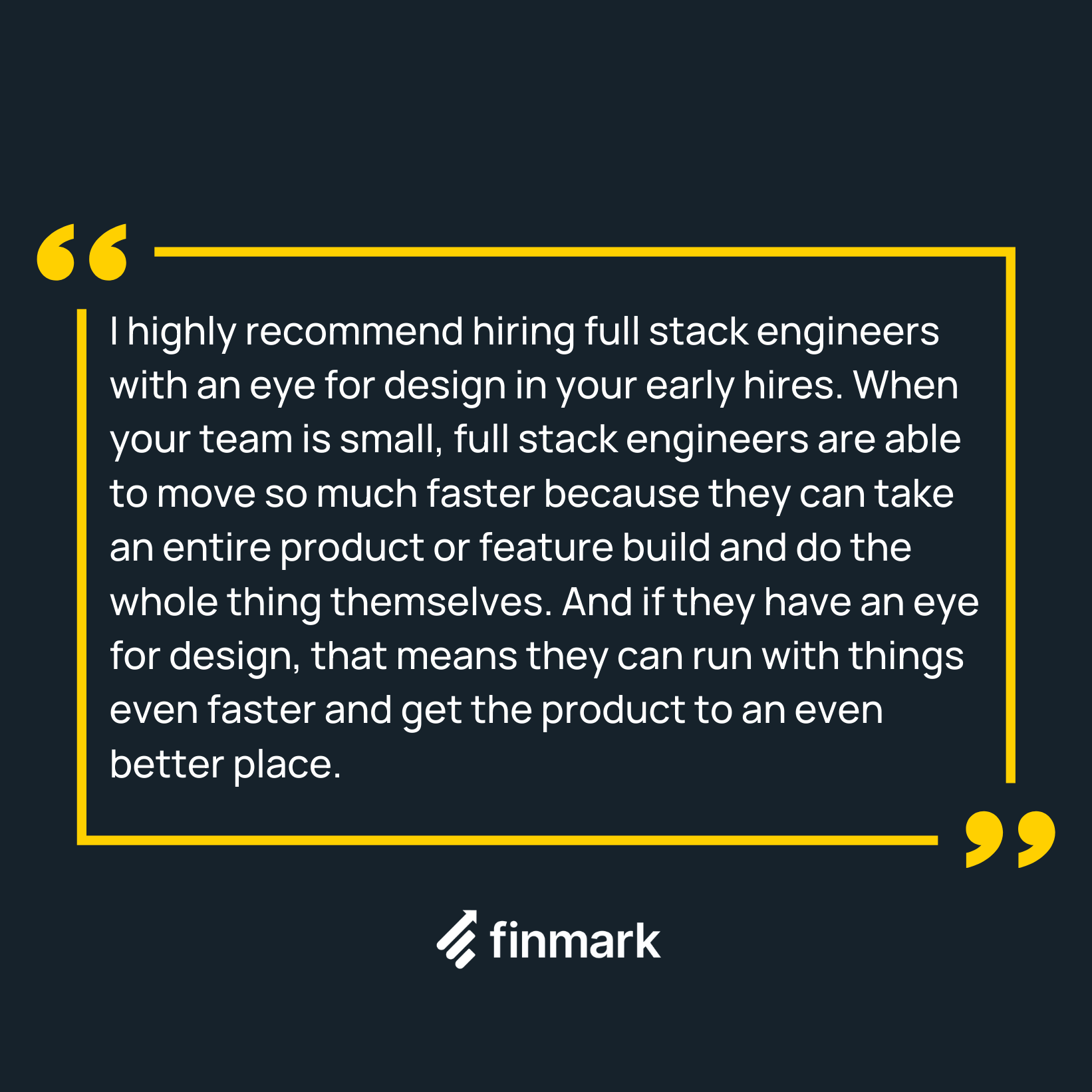
Marketer
If you’re unsure about how you’re going to get leads or how to get people to hear about your product, a marketer can come in handy. Specifically, a marketer that’s focused on acquisition and growth.
What happens in many cases is founders will get through the initial launch and generate buzz through Product Hunt or other channels. The launch results in a surge of new users, but there’s no plan in place for generating an ongoing stream of new users and customers afterward.
That’s when a marketer can be a good choice for one of your first 5-10 hires.
Another thing to consider is your go-to-market strategy. Are you a sales-driven or marketing-driven startup?
Companies with longer sales cycles and high-ticket products (i.e. Pardot) might not need a marketer as one of their first 10 employees.
On the other hand, if you’re selling lower-priced products that are self-serve and don’t require as much hand-holding to convert leads (i.e. Trello), then a marketer will likely be a bigger priority as an early hire, just like the Canny example from earlier.
Sales
Your go-to-market strategy is important for this choice as well. If you’re selling complex and expensive products to a smaller audience, it could make sense to hire a salesperson early on—especially if you’re not a great salesperson yourself.
Salespeople are often early hires at B2B startups selling to enterprise companies. When each deal adds $1,000+ of monthly recurring revenue (MRR), it’s a lot easier to justify hiring a salesperson within your first 10 employees than when you’re selling a $50/month product.
With early sales hires, we often see startups hiring people who fill sales and customer success roles. Not only do these early hires host demos and do outreach, but they also do customer support as well.
Eventually, you’ll be able to break these two roles out into sales and customer success, but within your first 10 hires it’s helpful to find people who can do both.
Admin & Operations
This is more of a vague role, but several of the founders we reached out to mentioned it in some form or fashion.
Essentially, this is someone who helps with the day-to-day running of the business. Whether it’s making sure everything around the office is fully stocked, creating systems and processes for the company, scheduling, or other administrative tasks, this role can be a huge time saver for founders.
When you only have four or five employees and everyone reports directly to you, things like sending welcome packages to new employees or getting paperwork filled out on time are manageable. Once you reach 10-15 employees, those things will fall to the very bottom of your to-do list.
If your employees need to call you to restock water in the office right before you’re about to speak at a conference, that’s a good sign that you need to hire someone to take over the admin side of your startup (yes, that actually happened).
Industry Specialist
Another interesting trend we noticed from the founders we surveyed was that several of them had some type of specialist specific to their industry.
For instance, Vouch provides business insurance for startups. Their first 10 employees included a chief insurance officer and a compliance analyst. Flashpoint provides intelligence software for security and risk management, so they hired several analysts within their first 15 hires.
If your startup is in an industry that’s highly technical or you’re not necessarily an “expert” in the field, hiring an industry specialist early on can give you more credibility and save you from making costly mistakes.
Where to Find Your First Hires
Another common question founders have is “where’s the best place to find new hires?”
The problem isn’t that founders can’t find applicants—it’s that they can’t find qualified applicants.
I’ve had several founders and C-suite execs reach out to me over the years asking for suggestions to find good marketers because the applicants they get aren’t qualified enough. If you’ve posted a job listing, I’m sure you’ve had a similar experience.
The problem with a lot of job boards is they’re packed with applicants. Plus, the application process is usually automated so people can apply to tons of startups in minutes.
The end result is you being bombarded with dozens or even hundreds of resumes.

If that doesn’t sound like a pleasant experience, here are some better sources to find your startup’s first hires.
1. Your Network
This should be the first place you look.
Start with people you’ve worked with before. That eliminates the need to qualify a person’s skills. It’s just a matter of translating their skills into a new company.
Hiring from your network could also mean reaching out to connections and seeing if they know of anyone that’d be a good fit for the position you’re hiring for.
The advantage of this is the person giving you a referral will filter out unqualified people for you since most people won’t refer a person that’s not qualified since they’re vouching for the referral.
2. Social Media
Social media is another great place to find your first employees. In fact, it’s where Josh Pigford found some of his first employees.

Obviously, this is a lot easier to do if you have a following (more on this later), but LinkedIn is another great option where you don’t necessarily need a large audience to get applicants.
Since people primarily use LinkedIn for business, it’s a great place to share job openings without receiving as many unqualified applicants.
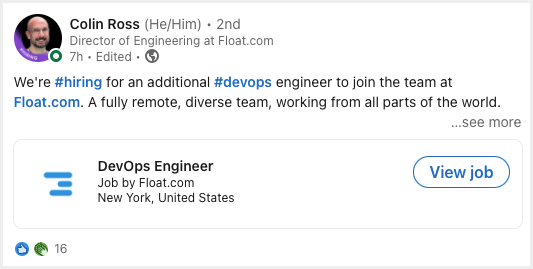
Competitors
Ok, this one might be a little controversial. As sneaky as it may sound, your competitors are often a good place to find your startup’s first employees because:
- They’re familiar with your industry
- They have a proven track record
- Their experience gives them added value and credibility
You can use LinkedIn to find your competitors’ employees. First, go to the company’s LinkedIn page. Then, click on the number of employees.
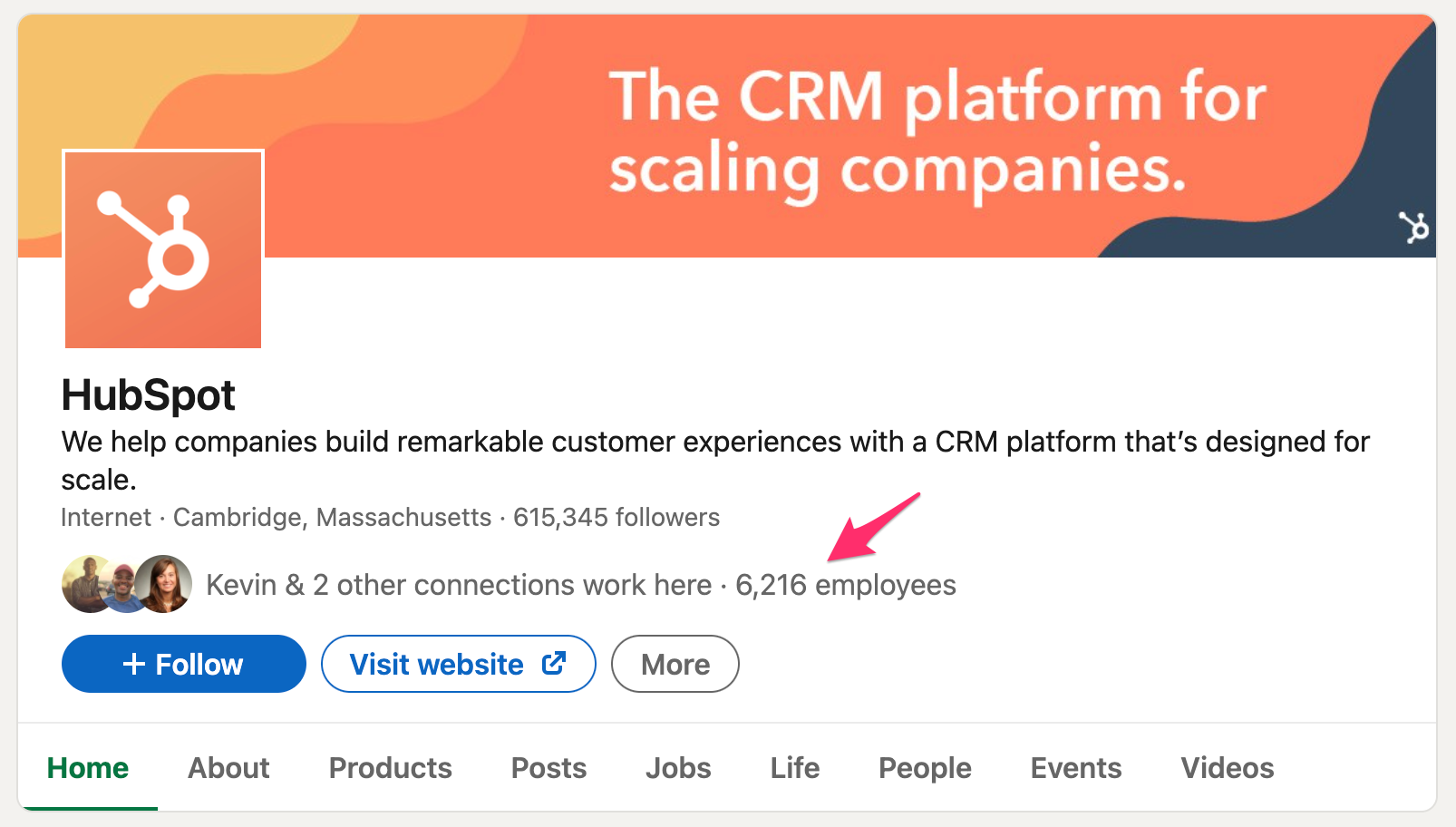
That’ll take you to a list of all the company’s employees.
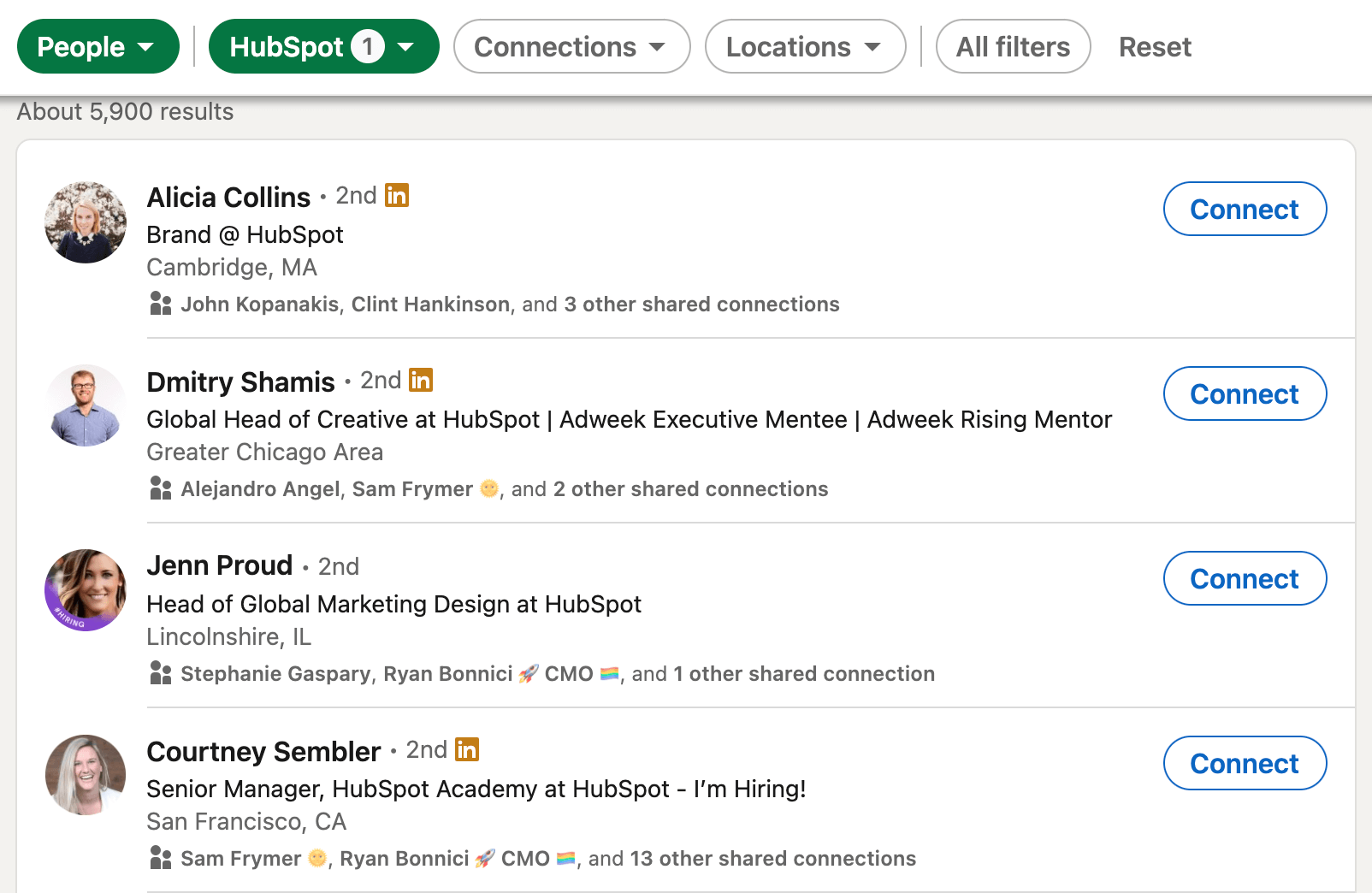
Then, simply send them a message or connection request and tell them what you’re looking for.
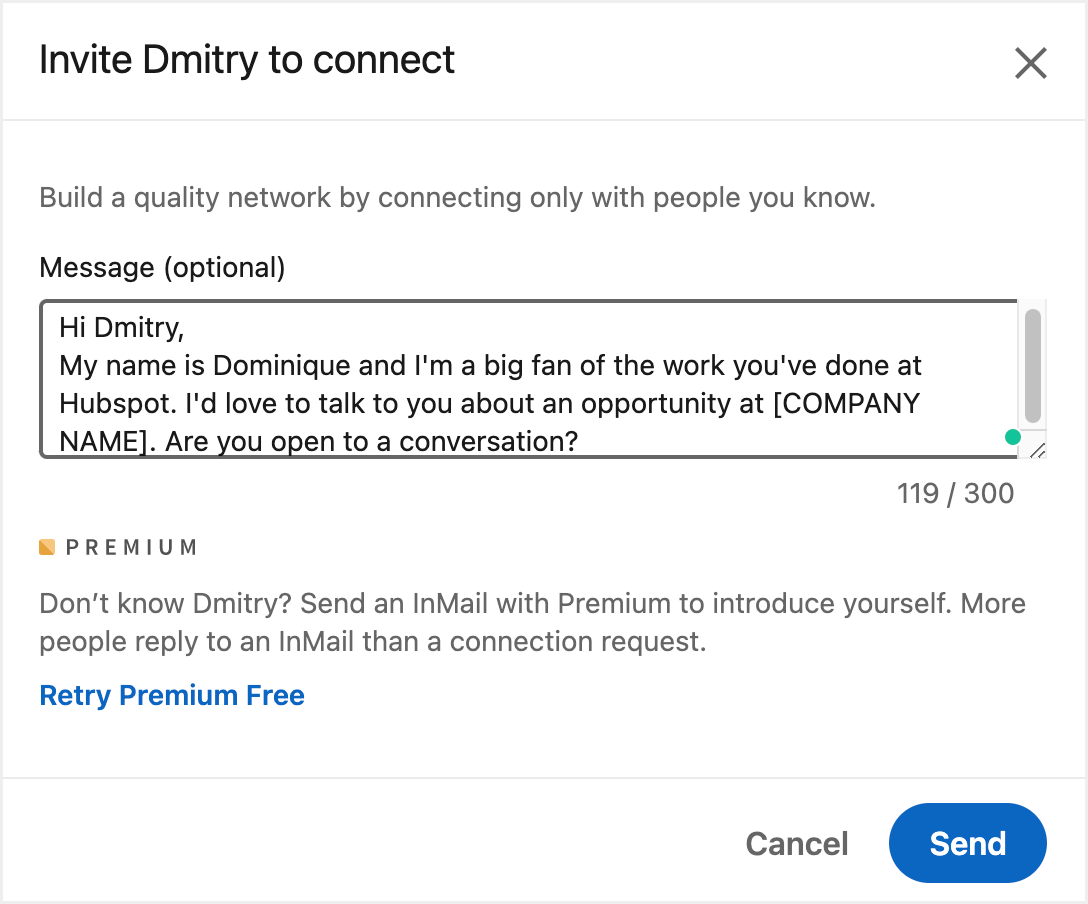
This tactic works best for roles that are more public-facing (i.e. marketing and design) because you can see their work. However, you should always qualify any potential new hires beforehand to make sure they’ll be a good fit and have the skills you need.
Your Investors
Investors are an underutilized source of first hires for startups. Investors typically have a very wide network of companies they’ve worked with and can be great matchmakers.
One of the biggest benefits of getting referrals from your investors is they’ve likely worked with people in your industry before. Even if it’s not directly, they can connect you with founders from other startups in their portfolio who can refer people to you.
Job Boards
Yes, I spent the beginning of this section talking about the downside of job boards. However, not all job boards are bad. Plus, if you don’t have an existing network or the other methods on this list aren’t an option, job boards can still work.
In order to save some time though, consider posting to niche job boards. For instance, startups often use sites like AngelList because they’re more likely to get applicants that have experience working with startups.
You can even look at role-specific job boards like Dribbble and Krop. Whatever type of position you’re looking to hire, there’s more than likely a niche job board for it.
How to Attract Quality Talent As a New Startup
One of the toughest challenges that come with hiring the first employees at a new startup is attracting high-quality talent.
Sure, you could just hire a bunch of new college grads, but experience really comes in handy when you’re building the foundation of your startup.
The problem is that most of the best talent has already been scooped up. On top of that, experienced people usually want higher pay which can be hard to offer if you’re not well funded.
So what can you do to lure quality talent to your startup?
Build Your Personal Brand
Hiring people is easier when you’re a well-known figure, particularly in the startup community.
Not only does it make it easier to find applicants, but it’s easier to bring them on board.
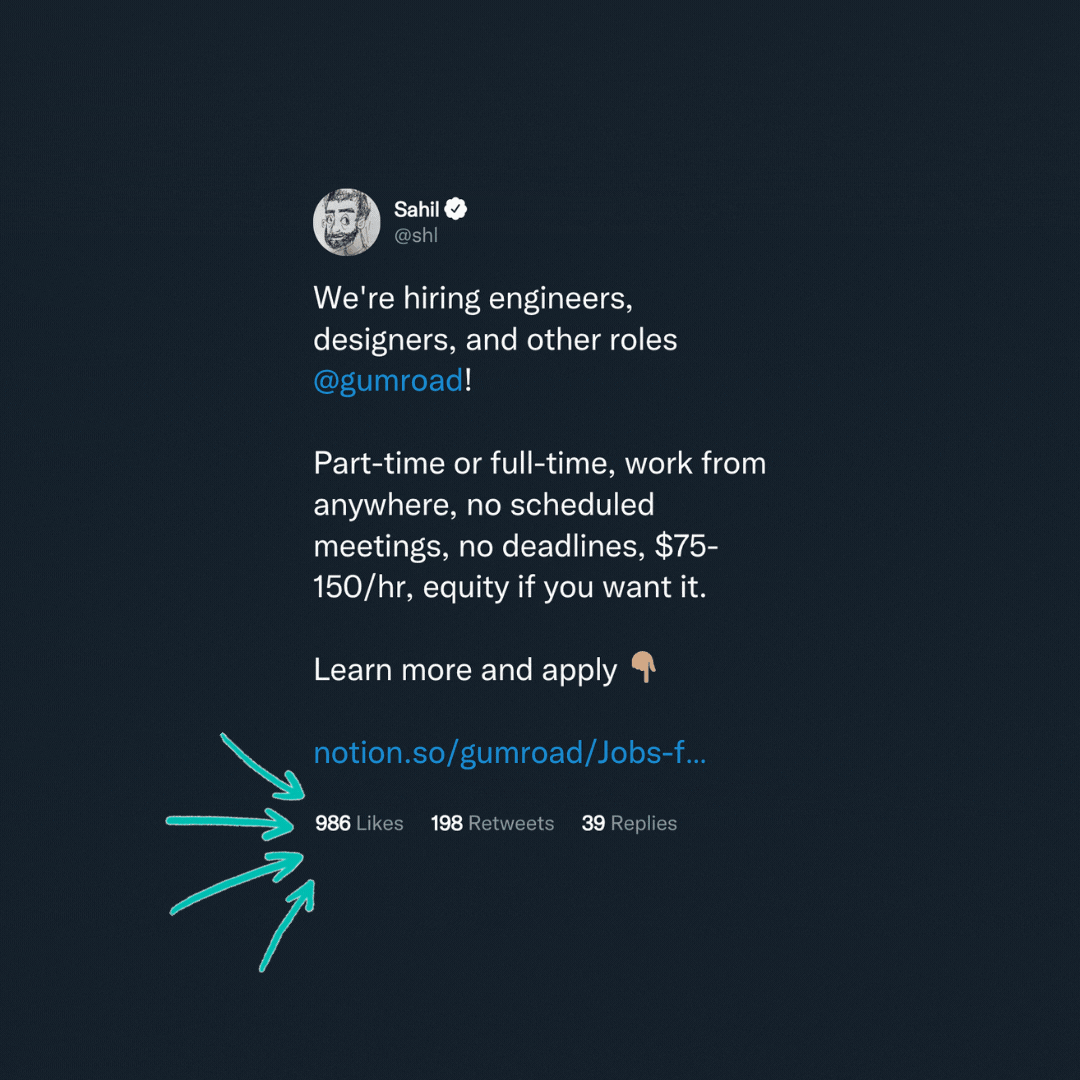
For some people, being able to work with someone they follow or respect is worth more than a higher salary at an established company. While it takes time to build up your profile, the sooner you start, the better.
Get active on social media, appear on podcasts, and contribute to online communities. It all compounds over time. Even if it doesn’t pay off immediately, it’ll make recruiting a lot easier (and cheaper) later on.
Sell Them on The Future
One of the key things that sold me on Finmark as a company was the conversation I had with our CEO about the future of the company.
I had never worked for a startup that was as new as Finmark, but the vision Rami (CEO) has for the product and the larger mission of what Finmark would do for founders aligned with what I was looking for.
The takeaway is that as a founder, sharing your vision for the company is one of the most effective ways to win over more experienced talent for a new startup.
Be honest and transparent about where the company is at the moment, but fill them in on the long-term goals and vision for the company.
Offer Growth Potential
This is something that works well if you’re recruiting your first hires from a competitor.
Look for people who have been with a competitor for a couple of years but haven’t gotten a new job title over that time period. It could be a sign that they’re not moving up in the company.
As an early hire at a new startup, you’ll be able to give them plenty of opportunities for their role to evolve as the company grows.
Equity
People have different views on offering equity to early employees.
On the one hand, it’s a good way to encourage employees to stay with you for at least a couple of years.
Generally speaking, people interested in receiving equity (especially if it’s in exchange for a lower salary) know that in order for it to fully vest, they’re going to have to stay with the company for a certain period of time. There’s a lot of added value in that since people don’t tend to stick around at startups for very long.
On top of that, it also gives them more motivation to help the company grow since they have an opportunity to share in the success.
On the other hand, most startups fail—around 90% according to some sources. That means there’s a 90% chance that the equity won’t be worth anything, so some employees will prefer to just have a higher salary.
If you plan on offering equity, be careful about giving away too much. It can be a red flag for investors and make it more difficult to raise money.
Not sure how much equity to offer new employees? Here are a couple of calculators and resources to help you out:
Focus on What’s Important to Them
Overall, the best way to recruit top talent for a new startup is to find out what they care about and offer it to them.
Whether it’s equity, growth, more responsibility, or something else, find out what’s important to them. If it’s something you can offer great! If not, it’s best to let them know up front and tell them about what you can offer.
Traits to Look For in Your Startup’s First Hires
Hiring employees #1-15 at a startup is different than hiring employees #50 and beyond. The skills and mindset of your first employees will likely be different than what you need by the time you’re at 50+ employees.
Here are some of the main characteristics you should look for in your startup’s first employees.
Experience
One tip I got from Aazar Shad, who’s hired first employees at a few different startups, was to hire people with more experience than you in their field if possible.
For instance, say you’ve been handling customer support tickets yourself as a founder. You might be doing a decent job, but chances are it’s eating up a lot of your time and it’s not your specialty.
If you can find someone who’s worked in customer support for a couple of years, they’re going to have a different level of expertise that can help you retain more customers, grow faster, and set up more efficient systems and processes.
Swiss Army Knife
Your first hires don’t always need to be specialists.
For instance, your first marketer might be a general marketer who has some experience with SEO, email marketing, social media, and paid advertising. They might not be “the best” at any one particular field, but they know what needs to be done and how to do it.
Eventually, you’ll be able to hire specialists that are better at each of those individual channels. With your first hires, though, a general marketer with decent skills in each area is more realistic if you can’t afford to hire an entire marketing team.
The same goes for other positions. You might start with a full-stack engineer rather than having a separate front-end and back-end engineer. Your customer success person or growth marketer might also help with sales.
The more your first employees are able to do, the more you can accomplish with fewer resources.
Leadership
This goes hand-in-hand with the previous trait. Sticking with the marketing example, the fact that the person has some knowledge and experience with different areas of marketing is a great benefit because you can build support around them with specialists.
However, that person should also be someone who has experience managing others or at least has the potential to do it.
You can figure that out in the interview process by asking them what they envision their role in the company evolving into as you grow.
If they say they want to step into more of a managerial role, then it’s a good sign they could be in a leadership position at some point. If they prefer to be more of an individual contributor, that’s fine too, but it means you’ll need to plan to hire someone more senior in the future.
Keep in mind though, if your first designer, marketer, engineer, or other role is someone that wants to be a future leader/manager, that’s a very valuable trait.
Self-Driven
Your first hires won’t have a foundation to build on—they’re the people who create it. They won’t have department heads to report to or tell them what needs to be done. The type of people who thrive in this type of environment are self-driven.
Think of your startup as a person trying to reach a destination. As a founder, your job is to give your team the map and let them know your starting point and destination. Your team is responsible for helping to figure out the best route.
Self-driven people will be able to take your map and figure out which roads to avoid and where potential pitfalls are. Non self-driven people will need you to find the best route and give them turn-by-turn directions.
In the early stages of a startup, you should look for the former, not the latter. It’ll save you time and money, plus help you reach your destination faster.
A Doer
Some people are very good at coming up with plans and strategies, but aren’t great at executing said plans. Either that or they prefer to have a team they can delegate to.
For your first hires, you need people who can do the work.
For instance, your first sales hire should be someone with recent experience in giving demos, doing cold outreach, and similar tasks, as opposed to a more senior person (think VP of sales at an enterprise company) whose day-to-day primarily involves reporting and strategizing.
The first years of your startup are filled with the “grunt work”, so you need people who are ready and willing to roll up their sleeves.
Tips For Hiring Your First Employees
Lastly, I want to finish this guide up by giving you some general tips. If this is your first time hiring at a startup, there are some common pitfalls you can avoid to save time and money.
Give Yourself Enough Time
Don’t make the mistake of assuming that you’re going to put up a job listing, immediately find the right person, onboard them, and have them up and running all within a matter of weeks.
Remember what I mentioned at the beginning of this guide about pain points? If you wait until the pain point has gotten to the point where it feels unbearable, you’ve probably waited too long to hire.
That means you’ll likely end up rushing to hire someone who might not be a good fit because you’re just trying to get the task off your plate. That’ll result in turnover and even more wasted time when you inevitably have to let that person go and find someone else.
Trust me, take your time to hire the right person. It’ll pay off in the long run.
Make Sure You Can Afford to Hire
We’re big fans of data and numbers here at Finmark. Before you go on a hiring spree, do the math to determine:
- When you can afford to hire someone
- How many people you can hire
- How much you can afford to pay them
- How each new hire will impact your financial plan
Not sure where to start? A financial model will help you out significantly. You can build out your entire hiring plan and answer all four of the questions above. I recommend using Finmark 😉.
Don’t Get Blinded By Large Companies
Another mistake startups make with hiring their first employees is trying to hire people that come from big companies. Sometimes, the skills you need to be successful at a 500+ employee company don’t translate to a 10-person startup.
When you’re going through resumes and see that a person has worked at large well-known companies, that doesn’t necessarily mean they’ll be a good fit for your new startup.
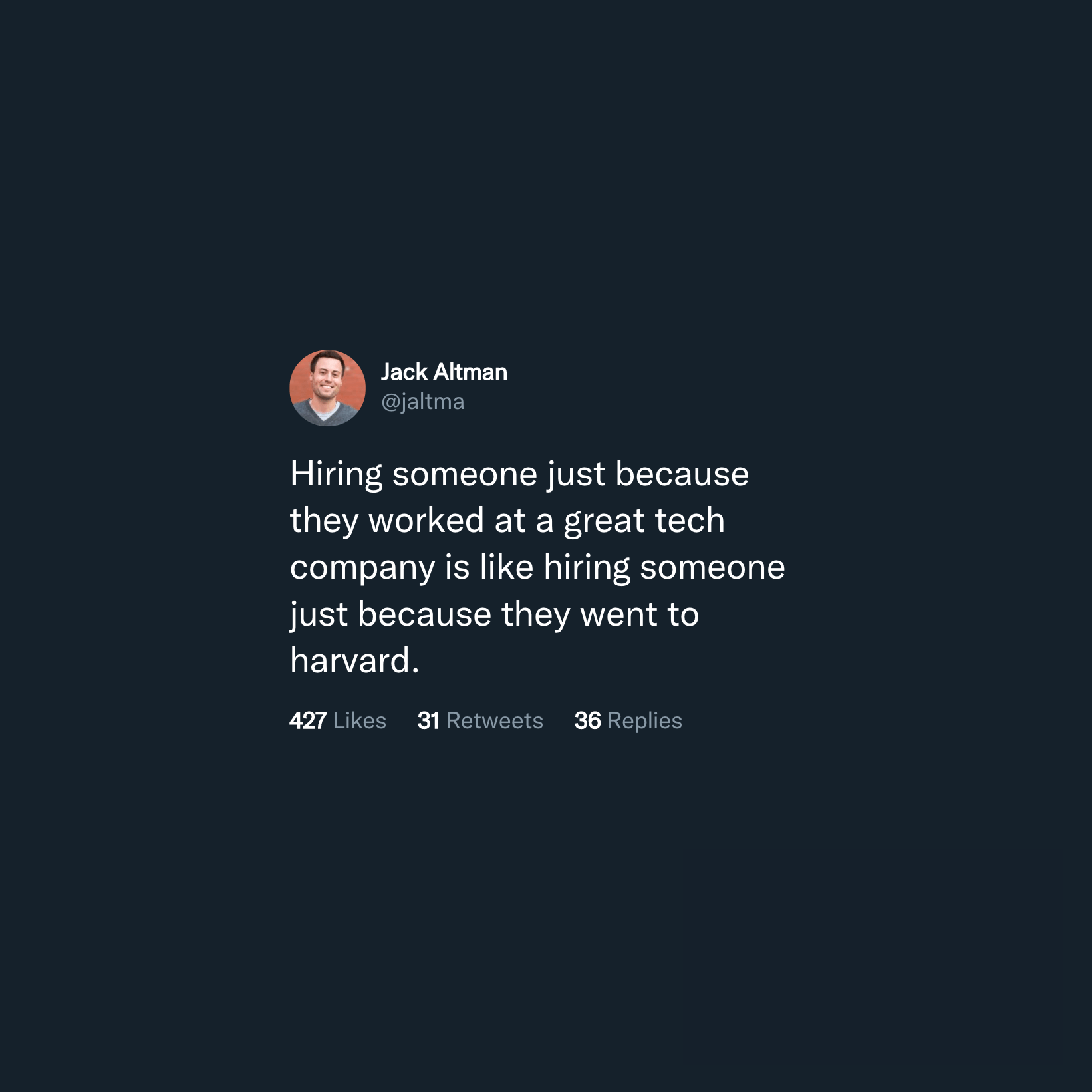
Build Your Culture
The only way to build a great culture at your startup is to hire great people. I don’t just mean great people in terms of skills, but also personality.
If the culture is negative, lazy, and uninviting, you’re going to have a tough time attracting and retaining people long-term. This tip is so crucial for early-stage startups because that’s when it’s tempting to hire based on skill first.
You want the best marketers, designers, and engineers in order to build the best product. But if their skills come at the expense of a positive culture, it’s not worth it.
Ready to Hire?
Making your first hire(s) is always an exciting time as a founder. It’s a sign that you’re growing and the extra help should accelerate that growth.
When you know what to look for and which roles to hire first, the process goes a lot more smoothly. In addition to all the tips we gave, it’s also important to plan for your new hires financially.
Finmark is a financial planning tool that makes it easy to create a hiring plan and forecast exactly how much each new employee will cost you over the next few years, plus how it’ll impact your growth.
You can try Finmark free for 30 days by signing up for a trial here.
This content is presented “as is,” and is not intended to provide tax, legal or financial advice. Please consult your advisor with any questions.
